Vacation rentals: Changing the face of neighborhoods
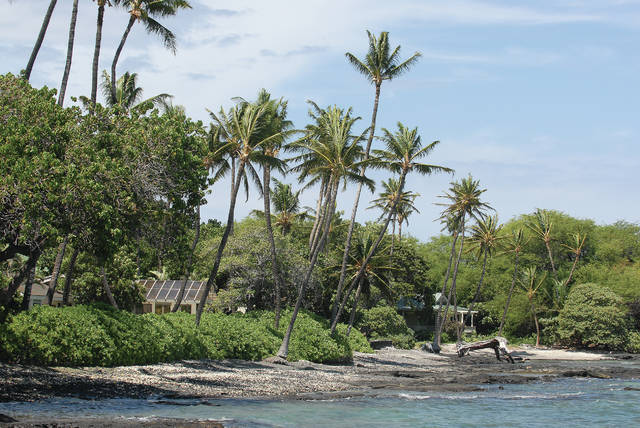
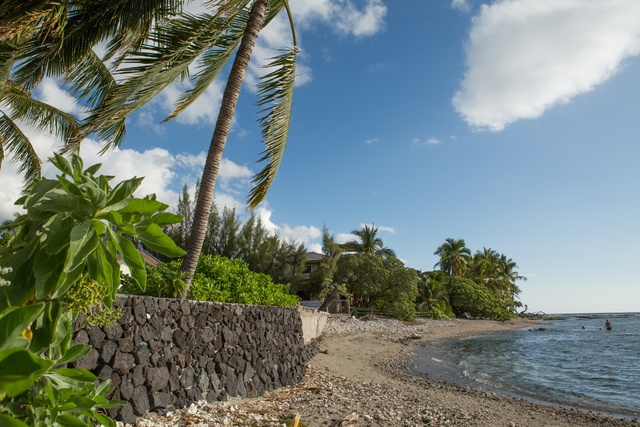
Residences along the coast in Puako. (PHOTO BY ANNA PACHECO/SPECIAL TO West Hawaii Today)
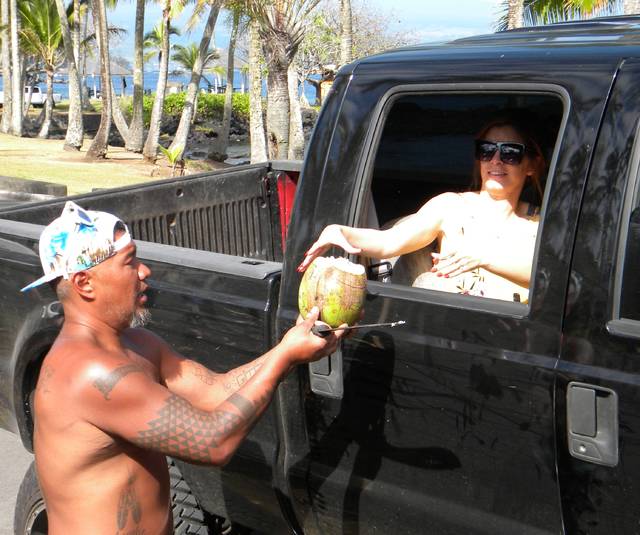
Koa Kealoha, across from Richardson Ocean Park, offers a freshly cut coconut to Cindy Soto, who is visiting from Los Angeles.
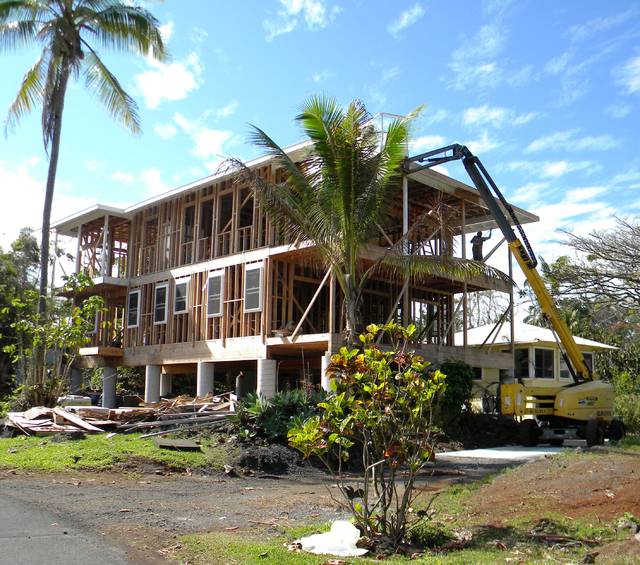
This single-family home, a future vacation rental with attached ohana unit, towers over its neighbors in the Leleiwi ocean-front community near Hilo. (Photos by Nancy Cook Lauer/West Hawaii Today)
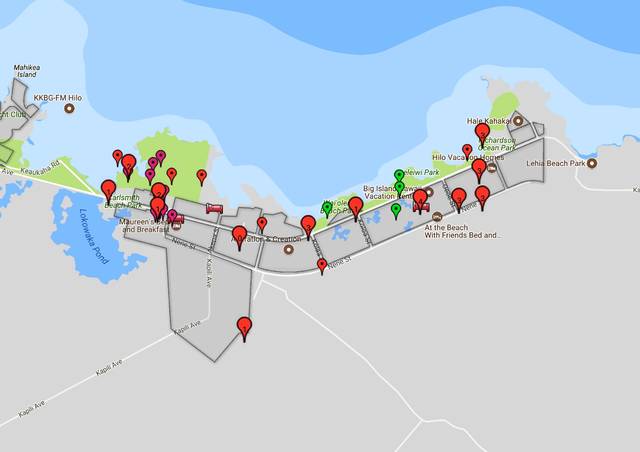
Vacation rentals (red) and home-shares (green) dot the Leleiwi community. Pins approximate for security reasons. (Map data: Stefan Buchta via Google Maps API /Special to West Hawaii Today)
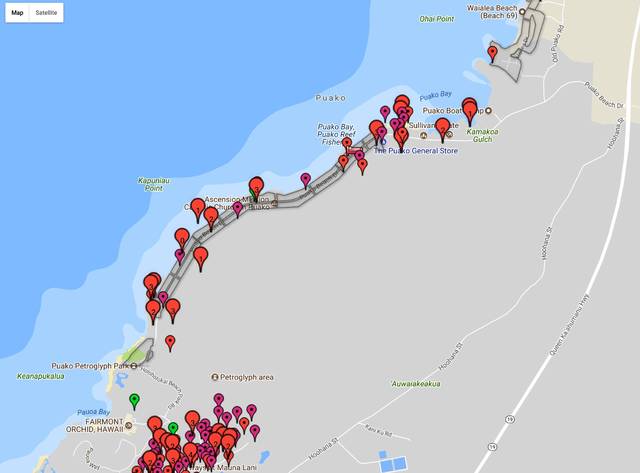
HILO — It’s a sunny day in the oceanfront community of Leleiwi, and Terry and Jayne Oliver of Butte, Montana, are strolling the lawn of their vacation rental.
HILO — It’s a sunny day in the oceanfront community of Leleiwi, and Terry and Jayne Oliver of Butte, Montana, are strolling the lawn of their vacation rental.
The couple, here for 10 days, use the tidy white house as their base as they travel the island, exploring its many attractions. They prefer vacation rentals to hotels, they said, because it’s a nicer atmosphere, it’s more relaxing and it includes amenities such as a kitchen.
“It’s more like a home,” Jayne said.
Just around the block, Native Hawaiian homeowners live along narrow, leafy Nene Street, which backs up to Keaukaha Homestead, a Department of Hawaiian Home Lands neighborhood. Here, friendly residents talk story with a reporter, but they don’t want their names used.
Are they bothered by all the newcomers and vacationers in their neighborhood?
An older man working on his yard pantomimes blinders, such as would be put on a horse. What’s the point, he asks.
“For us to talk about these things makes no sense,” the man said. “They coming, they coming, they coming and they’re not gonna stop.”
Longtime residents of Leleiwi, an 80-home community between Carlsmith and Richardson ocean parks about 5 miles from Hilo town, worry about gentrification of their laid-back little corner of paradise. Almost a quarter of the homes have been converted to, or are being used as, vacation rentals, estimates Stefan Buchta, a member of the Leleiwi Community Association.
Across the island, the Puako community is experiencing a similar influx of vacation rentals. These are probably different from vacation rentals in other areas, said James Fritz, who rents out his home sometimes and lives in it other times.
The upscale community of largely part-time residents, where vacation rentals can go for $2,000 and up nightly, aren’t as likely to notice an influx of newcomers as would residents of long-established neighborhoods, he said.
But other formerly close-knit little communities all over the Big Island are feeling the impact of vacation rentals in their neighborhoods.
Some are taking a “if you can’t lick ‘em, join ‘em” approach, converting their own homes into vacation rentals, too. Some are bailing out, putting their homes up for sale.
Others hope the County Council can create regulations that stop the spread.
But owners of vacation homes already on the island, and their representatives, aren’t confident they’ll be able to continue operating, even with a grandfather clause. Those in residential and agriculture districts, especially, worry the county won’t give them a special certificate they’d need to stay in the business.
“If they denied my application for whatever reason, I would absolutely have to sell,” Heather Bandt, who lives in her Aloha Kona home four months a year and rents it out as a vacation home the rest of the year, said in an interview last month.
Zillow, an online real estate database, shows homes for sale in the neighborhood ranging from $425,000 to $684,000. Bandt said her family built their home, so it has a lot of sentimental value. But she needs to be able to pay her mortgage, property taxes and other expenses, she said.
Buchta has been compiling islandwide data for a presentation before the County Council when it takes up Bill 108, which would regulate vacation rentals. He said the bill has taken on a life of its own.
“People with vested interests are pushing back hard,” Buchta said. “But the longer we put it off, the worse it will be.”
Bill 108 would require existing transient vacation rentals outside of the Vacation District, the General Commercial District or Resort Nodes to apply for a nonconforming use certificate in order to be grandfathered in. Those in the allowed districts would be required to register with the county, but they don’t have to apply to the Planning Department for the special permit.
Short-term vacation rental is defined in the county bill as a residential dwelling where the owner or operator does not reside on the building site, that has no more than five bedrooms on the building site for transient use, and is rented to transients for a period of 30 consecutive days or less.
The bill doesn’t regulate so-called “hosted” rentals, where the owner lives on-site. Bed and breakfasts are already regulated by the county.
The county bill is on hold until after the Board of Ethics rules on whether North Kona Councilwoman Karen Eoff, one of the co-sponsors, has a conflict of interest because she owns a vacation condo in the Vacation District along Alii Drive. The board next meets March 19.
It’s not easy to get a grasp of how many Big Island homes are being used as short-term rentals, defined by the state as any rental of less than 180 days. Landlords who rent short-term are required to register with the state for transient accommodations and general excise tax licenses and remit the required taxes to the state. It’s not known what percentage have done so.
Ross Birch, executive director of the Hawaii Island Visitors Bureau, used Hawaii Tourism Authority figures from its 2017 visitor plant inventory in a recent presentation to the County Council.
The tourism industry estimate of 8,647 advertised vacation rental units on the Big Island probably overstates the issue, as it includes duplicates from several vacation rental platforms. Buchta estimates the number to be closer to 4,859, deriving his information strictly from listings on Airbnb.
Airbnb is the third-largest vacation rental platform on the island, a company spokeswoman said.
It’s not known how many owners are currently paying the required TAT and GET. Owners of multiple units usually operate under one tax license, and tax information, other than the name and license numbers of those registered, is confidential. A 2017 survey by the tourism industry resulted in 2,037 Big Island rentals being voluntarily reported.
Bills in the Legislature would allow vacation rental platforms such as Airbnb to collect taxes on behalf of the landlord, strengthen counties’ ability to enforce zoning and land use laws and make it unlawful for transient accommodations brokers to engage in business with operators that are not in compliance with all state laws and county ordinances.
They’d also give each county $1 million to set up a registration, property taxation and tracking system for vacation rentals.
Their future remains uncertain, however, as key bills were recommitted to committees on a deadline Friday and other bills moved forward. It’s said no bills are dead as long as the Legislature is in session, but it remains to be seen whether this regulation will survive until the May 3 end of session.
“We’ve got to regulate this, and that’s what we’re trying to do,” said Mayor Harry Kim. “It’s not just the impact to county services, but what it does to the lifestyle. You don’t put a store in a residential neighborhood, so why would you put any other commercial building?”
Richard Standke, who owns five of the vacation rental houses in Leleiwi and two others in Hawaiian Beaches, said the influx of new money brightens up neighborhoods, employs housekeepers and construction workers and creates quality housing.
“The taxes paid by tourists help support local government services,” Standke said. “New, beautiful homes make neighborhoods beautiful.”
Standke, who lives in Los Angeles, said vacation homes in the Big Island’s oceanfront communities don’t compete with local housing, because land is “dirt cheap” on the island. There is plenty of room for lower-priced homes and rentals on the island, he said.
He said his quality short-term rentals wouldn’t be used for longer-term rentals because he wouldn’t be able to recoup his investment. Other transient landlords have said they fear putting their property into long-term rentals because it’s so difficult to evict scofflaws.
“This is one of the nicest places on Earth to visit,” Standke said. “To rent it to one family is not a good use of oceanfront property.”
Close to Richardson Ocean Park, Koa Kealoha, another longtime local, offers a freshly cut coconut to Cindy Soto, who is visiting from Los Angeles. She’s touring the area in a dusty black pickup truck driven by one of Kealoha’s buddies.
Kealoha doesn’t want to see the neighborhood change around the one-story home he inherited. But he, too, acknowledges the inevitable.
“It’s going to happen,” Kealoha said. “You can surround me. Just surround me with love. If you surround me with hate, you’re going to get it back.”
Lounging in a lawn chair in his front yard with a beer and a cigarette and surveying the surf across the street, he smiles a slow, easy smile.
“This is the life,” he said. “You’ve got to live the life.”



“The upscale community of largely part-time residents . . . aren’t as likely to notice an
influx of newcomers”
Oh, we notice! A rotating mix of people here on vacation ends up being 90% party time, loud music and loud drinking at all hours. That should be kept to resort areas, not quiet neighborhoods where a lot of people sleep with the sun, no matter how well off they are.
Loud music and parties should be addressed by the laws that regulate them. I have extremely rude and loud neighbors, with constantly barking dogs… and they are full time owners.
Of course, when you try to see those laws enforced the result will be (a) complete apathy from the police, who have better things to do, and (b) scorn from the neighbor, and the risk of developing a full blown war that might even lead to violence. I think prevention is a better strategy than trying to deal with the disease.
Yes, we surely do notice. The zoning laws state that there are a few zones where vacation rentals are allowed, and they should be restricted to those areas and shut down where they are prohibited, like residential zones where people are just trying to live their lives.
WHT continues to confuse readers by referring to a non-existent “vacation district.” There is no such thing in either current County land use laws (the Zoning Code and Special Management Area regs) or in the proposed “Bill 108.” The report should instead correctly describe this as is written in the Bill, and as it is stated in the Zoning Code: The “resort-hotel district” which uses the letter “V” as its “short-hand” designation (just as single-family residential zoning is also called the “RS” zoning district).
So, Bill 108 proposes uses be restricted to the V (resort-hotel) zoning district and several other zoning districts, with “use permits” (including public hearings) from the Planning Commission in certain other areas. Why the Zoning Code uses the letter “V” to symbolize the Resort-Hotel zoning district is irrelevant and speculative. My guess is that it was conceived in the original zoning code (1967) to represent “visitors.”
Mahalo, Colin!
to represent “visitors.”
Or “vermin”.
It’s sad that it’s gotten so bad that local families feel that they can’t say or do anything about all the illegal vacation rentals because the County has been so lax in enforcing its zoning code. And outrageous that some off-island investor thinks local families are not good enough to be allowed to live in or rent homes in beautiful spots on the island; that those spots should be saved only for tourists!
When almost all of the beautiful coastal ‘aina on the Kohala coast was grabbed and set aside for tourist accommodation development, it was very painful for the people of this island. These were the beloved places we trekked to for weekend camping with the ‘ohana. One by one, every lovely beach was overtaken by hotels and vacation condos, and the hotels started coming up with ways to restrict locals from accessing what the hotels thought of as “their” beach. The crowning insult came when an enormous hotel was proposed right on a state beach park at Hapuna. After years of protests, that hotel was finally approved when the developer promised that they would set the hotel far enough back that it couldn’t be seen from the beach.
Well, we all know what happened. The developer reneged on their promise. Now, it’s true that if you are sitting on the beach, looking out at the ocean, you can’t see the hotel at all.
So, we all came to accept that the Kohala coast hotels are there to stay, but took solace in the fact that our residential neighborhoods were zoned to be free of tourist accommodations, except for the occasional legal, permitted B&B. We who bought homes in residential neighborhoods were assured that our neighborhoods would be for us and our neighbors.
But due to the County’s utter irresponsibility in failing to enforce the zoning code, now many of our neighborhoods are 25%, and more, invaded by illegal vacation rentals.
It can’t keep going like this.
Wahineilikea, yes, exactly. In our neighborhood, we now have bidding wars between vacation home developers and local residents. In two cases, bids by people we personally knew – a nurse at Hilo Medical and a local Hawaiian family – were overcome by developer cash offers that were higher than the listing price. This is creating suffering and ill will. More neighbors are starting to wake up to this. I think it is fair to say that the county permitting process is broken. For example, we found that one section (plan approvals) does not really read the documents a developer already submitted in to another section (SMA approval). When asked, they declare, “this is not my responsibility, talk to *that* other guy. And, by the way, he is in Kona because that’s where the developer submitted! (Never mind the building is in Hilo.) Second, we have strange loopholes like the “ohana” house in our code, which is not really an “ohana”, because it allows uses that are not family-like at all. Lastly, county staff often hide behind a very narrow interpretation of the zoning code when you bring up a problem. That would never hold up in a public court, where intent of the code counts, not just the exact letter. So we have smart developers like Mr. Standke, the mini hotel builder, trying to exploit this fact. Sadly, we have no other option than to engage ourselves and double check everything, because we can not assume that our neighborhoods are automatically protected!
There is no “Tourist Zone” but you keep asking for more regulations, this is the problem with our Government from the Federal level down to City levels there are so many laws they do a crappy job at enforcing them so it is pointless to add more. This only confuses them when trying to do their jobs and slows the process down!
So far, enforcement has been weak. Now, we are all called upon to help. If you see a new vacation rental popping up in a residential or AG zone near you, write a complaint and follow up on it. A lot is at stake here. We want our children to grow up in the same Hawai’i that we all hold dear, and not in an area that looks more like Miami Beach or Big Bear, CA, where 80% of homes are vacation rentals.
@ Alex sorry but that is how trouble really starts turning in your neighbors. You can’t rely on our government and or police. Know the neighborhood before you purchase a home,
In my case, he isn’t really a neighbor because he doesn’t live here. I purchased my home 10 years before the first “Big Operator” short-term rental landlord from Los Angeles appeared and started buying up alll the lots, converting four entire houses. I love my community and have no intention to leave.
Exactly; it’s not “turning in the neighbors,” because these investor owners are not neighbors; they are investors seeking to profit from our county’s inefficiency.
Knowing the neighborhood is a great idea, for sure. But what about when you buy a home in a neighborhood you’ve done your research on, and you’ve also researched the zoning code for that neighborhood and have found that tourist accommodations, apart from the occasional permitted and licensed B&B, are prohibited there, and then settle in happily for a few years – only to find the neighborhood you’ve come to love being overtaken by illegal vacation rental homes, completely destroying the integrity of the neighborhood?
There is no “Tourist Zone,” but there are many areas where the zoning allows tourist accommodation businesses, and many where it does not. Nobody’s asking for “more regulations,” we’re asking for some clarification and effective enforcement of the zoning code that already exists.
Well good luck getting a straight answer. Sorry if I misunderstood you.
I have disgusting horrible long term rentals in my neighborhood. They are a true eye-sore and one of them is a 2 bedroom that 7 people live in with cars coming and going near constantly all day and all night. There is no recourse for me to get this long term slumloard to STOP allowing 7 adults to live in a home meant for 4. The homes are falling apart and the laws are a wasteland of trash and weeds. Is this somehow supposed to be accepted as a “local” neighborhood? Barking dogs and roosters is supposed to be something we want to protect? Squalor and trash isn’t “local” it is a lack of respect for the aina. We’re 6th generation in Hawaii, and we have pride of ownership in our home. We also open our doors to travelers. We aren’t causing people to vacation here, the Board of Tourism is…If you don’t want people to come to Hawaii then get rid of the board of tourism and close yourself off. But as the economy swings up around the world (China, Japan, Canada, mainland US) people are going to vacation more – and since the Big Island is being heavily advertised by the Tourism board, they’ve got to stay somewhere. I’ve rented my house out long term and it was an utter nightmare, my home was damaged, items stolen, rent and utilities unpaid- all because we had to go to Oahu for work. And I rented to people who were well paid highly educated adults. There needs to be a balance between tourism and the Big Island, but we should also not use a broad brush to paint all vacation owners in a bad light. “It’s not just the impact to county services, but what it does to the lifestyle” doesn’t mean accepting squalor as our baseline.
BustaBeeBee, long term renters can be a problem, but not necessarily. Me and my wife were long term renters for years both in Kona and in Hilo and we treated the houses as if they were our own. The part-Hawaiian family behind our house is taking great care of a mainlander’s house; Dave, the renter, told me yesterday that he personally dug out a leaking water pipe, cleared the backgarden and how he is even re-painting the house, all on his own costs. You can have positive and negative experiences, depending on how well you screen your renters,
As our direct neighbors we have two owner-occupant homes and two long-term rentals. There is no distinguishable difference between their behavior or the way they take care of their property; all are great neighbors. This is in stark contrast to when one of those homes was used as a vacation rental, which had tourists zooming up and down the gravel road, raising huge clouds of dust and once hitting a family’s dog, partying at all hours of the night, stealing our fruit because they though it was “wild,” and having LOUD 4-5 a.m. phone conversations (running their mainland businesses; we could hear every word) outside on the lanai. It was a nightmare.
Did you talk to the owner about their vacation rental? And what part of the Big Island are you? I have people picking my fruit all the time and won’t stop even when I ask. The long term tenants park on my lawn when they need overflow parking even when I ask them to stop. I’ve talked to the property manager, the owner, and law enforcement. Everyone says they can’t do anything. At least when you have vacationers, they leave after a few days. Imagine if they were running their mainland company while renting next to you long term. My point is there is little recourse for those living in an area that have turned into a long term rental community. At least the tourists LEAVE. Not all long term rentals are bad just like not all TVR’s are bad.
I have had both horrible homeowner neighbors and horrible long term renters living next to me in Hawaii. I’d prefer short term renters who leave in a few days no matter how bad they are over a long term nightmare situation. Your point goes both ways.
Apparently only wealthy people who can afford to own property in a resort zone are allowed to make money with vacation rentals. The rest of the struggling middle class and low-income homeowners shouldn’t be afforded that opportunity. This ordinance, co-sponsored by the corrupt and lying Karen Eoff, benefits the one percent. Meanwhile, in my neighborhood, the vacation renters who come and go are not the problem. They are not the ones with the pit bulls, parties, loud music, trash, junk cars, squatters, domestic violence, speeding, drugs and the like. The vacation renters who come and go by the dozens each week in my neighborhood are by and large respectful, quiet, courteous and welcomed.
There are several areas where tourist accommodations are legal, not just the resort zones. Besides, the people who own multiple homes so that they have the luxury of operating their extra houses as vacation rentals ARE the 1% – the rest of us are just local families who have somehow managed to buy just one house, or have somehow managed to find a rental home they can afford.
Not all local families are as you paint them. THIS is the problem, claiming that “local” families can’t afford anything as a baseline for the island. That is just simply not true. I am no 1% but I work really hard to have the things I have. I got educated, worked hard, and bought my house. THEN I lost my job so we airbnb to make our mortgage payments while saving money. Not all TVR owners are off island. Some of us are local families.
Busta Bee, I personally have no problem if you rent out an appartment in your house part time. But if you start to rent out whole dwellings in a residential neighborhood, local family or not, while being in a residential area, then you are impacting your neighbors. That would be business, not home sharing. And, at least in my community, we don’t welcome business activity, especially if it starts driving property prices and our taxes up
Busta, I hear you. There is a big difference between home sharing and vacation rental homes that are not owner-occupied.
Local families renting a room or small ‘ohana in the house in which they live are a way for local families to help make ends meet, and I think we need to allow for this activity. When the owners are right there, in control of the behavior of their guests, the impact on the neighborhood and the rental market is drastically less. Few homeowners rent rooms in their homes to long-term renters anyway, so that impact is negligible. As I understand it, Bill 108 does not seek to shut down home-sharing with visitors.
Off-island investors who are purchasing multiple homes to convert to illegal vacation rentals are a huge problem. Like the entitled and condescending Mr. Standke, who believe that local folks aren’t good enough to live in oceanfront properties (which he thinks should all be reserved for tourists) they have no connection to the community other than seeing an economic opportunity in the County’s lax enforcement of zoning laws. Standke lives in a Los Angeles community where the median home price is $1.7 million, so he thinks land here is cheap and ripe for his picking.
I understand your situation and I want to clarify that I didn’t say that local families can’t afford anything. Our ‘ohana also worked hard for the home that we bought and live in, and did so with the assurance that our neighborhood would not be infiltrated by a bunch of illegal, entire-home vacation rentals, which according to the code are not allowed.
Vacation rentals are not illegal. Where did you get that idea? You may not like them, but they are not illegal. And also, this bill does absolutely nothing to stop people from buying multiple homes. I don’t know why you are bringing this up. This bill is a clear attack on low and middle income homeowners who don’t own multiple homes. Only those in resort areas are able to operate a vacation rental without paying hundreds in fees and being at the whim of permitting by the state? Give me a break!! And it’s even worse that Karen eoff OWNS a vacation rental in a resort area! Ridiculous.
Yes, vacation rental homes in areas not zoned for tourist accommodations are illegal. The Hawaii County Code, Chapter 25 (Zoning) states that, “Any use not listed among the permitted uses in a zoning district is a prohibited use within that district.” Ergo, if a tourist accommodation business/vacation rental home is not listed as a permitted use in a specific district, it is ILLEGAL to carry out that non-permitted use in that district.
For the RS zoning district (single-family residential), for example, there is a long lost of permitted uses; some require no additional permits, while other necessitate some additional permitting. No kind of tourist or transient accommodation businesses are included in that list; therefore they are prohibited and therefore illegal in all RS zoning districts.
@wahineilikea you have obviously not read Bill 108. There is currently no such thing as an “illegal vacation rentals”. This bill is an attempt to define where those vacation rentals can be going forward, and to penalize anyone not in the wealthy resort zones by charging them $500 a year per home to be “grandfathered” in (fi they can get a permit, which the qualifications for have not been clearly defined). It does not have any mention of off-island investors.
Bill 108 is a bill, not law. It will likely go through a few versions before it is adopted. I am speaking of the current County Code, according to which vacation rental homes, in areas where they are not listed as permitted uses, are prohibited. When something is prohibited by zoning, that means it is illegal to engage in that activity in that zone.
Wrong. Vacation rentals are not illegal. A family staying in a home is residential use. Nowhere in the county code does it state that a family staying in a home for less than 30 days is business use. They do not make that distinction. That may change in the future but please stop misleading people by saying it is “illegal
Yes, they are illegal if they are located in an area not zoned for that. It is not a “residential” use, it is “transient accommodation of visitors” and is prohibited in many zoning designations, including residential and agricultural areas.
This is just plain old stupid….doesn’t understand Island lifestyle. – Standke said. “To rent it to one family is not a good use of oceanfront property.”
This kind of “good use” thinking is a major ingredient in the degradations of living environments. A friend who still moans the loss of his native San Diego remembers”: “I remember San Diego ineffectively trying to control how it would grow, and this ingredient took the form, “well, it’s not as bad as LA.” But look at it now.”
Karen Eoff should resign immediately. In what world does a councilperson get to LIE to a constituent about ‘not’ owning a vacation rental, and then turn around and co-sponsor a bill that benefits HER. Not to mention that she obviously hides her profits on said vacation rental, claiming to have never made more than $1000 a year since 2006 at the Islander Inn. RESIGN NOW.
Wutzhappen, this is getting old! Some of us here have tried to point out the facts to you, but you simply refuse to accept reality. Karen is only one of the co-sponsors of the bill. I find it a little suspicious that you keep focusing on Karen. Do you have several vacation rentals yourself? Please give us full disclosure. We want to be sure that there is not a conflict of interest
I don’t own a home, I rent. It doesn’t matter to me that Karen Eoff is “only” a co-sponsor of the bill. She LIED to a constituent and she’s lying about her profits at the Islander. Even if she had absolutely nothing to do with the bill, she was still caught lying to a constituent about not owning a vacation rental. That lie, in and of itself, should be grounds for her resignation.
you seem awfully protective of Ms. Eoff. Why is that?
Three reasons. I know firsthand that the bill was first drafted in the mayor’s office and that Mrs. Eoff did not create the rule that defines which zones, residential or commercial, are OK. If you want proof, simply contact the mayor’s office and ask. Ms. Eoff may get some benefit from it, but that would be purely accidential. Don’t you see that? The bill does not depend on Council Member Eoff. It can be sponsored by any council member. Second, Ms. Eoff’s record as a council member. The fact that she got Ooma into the land fund (!!!) and is sponsoring bills that protect us from commercial impacts of various kinds such as Helicopter noise. We discussed that already. Lastly, I am not overly religious, but I was raised with a Christian background where we give the benefit of the doubt. (You know, throwing the first stone and so on…) I don’t know Ms. Eoff well myself, but somebody who knows Ms. Eoff well told me through a friend, “Karen is a kindred soul who never lies. She may have slipped up, but she never lies.”
I call BS on your answer. You sound like you either represent her, or represent the lobby or politicians behind this proposed ordinance. I don’t believe she simply “slipped up.” She knowingly lied to a constituent about her Vacation rental ownership. I don’t give the benefit of the doubt to a lying politician who was caught red handed. As I said before, Even if she had absolutely nothing to do with the bill, she was still caught lying to a constituent about not owning a vacation rental. That lie, in and of itself, should be grounds for her resignation.
Nope. Not connected to politics at all. I am interested in a solution, hopefully soon, to a very specific problem. Any solution, Bill 108 or anything else that brings some sanity to my residential neighborhood where 20% of houses have been “converted”
I do appreciate that this article is more balanced than the others that have been posted. The numbers are way off. Ross Birch’s use of a VOLUNTARY plant survey to determine how many people are paying their taxes is just ridiculous and a horribly misleading (I can’t believe they even allowed that to be published the first time!). If you’re going to use numbers, try to make sure they are as accurate as possible!
The disappointment in this article is that the only example they used was an off-island owner with multiple rentals. That’s not necessarily the norm. Many of us are only able to live on the island due to the tourism industry, and our communities depend on the income from the tourism industry to survive. According to a study done of across Hawaii TVRs in 2015-2016, 66% of Hawaii TVR owners have to have that income to pay their monthly bills. I’m definitely one of those!
I don’t think TVR owners want no regulations – we know that won’t happen. But as it’s said in the article, as 108 stands now they could turn down applications for any reason. Bill 108 does not define the rules. There needs to be clarification, adequate time to be compliant (as there are no rules now), and guidance for going-forward. Because we know the tourism industry is not leaving Hawaii any time soon!
People who have a vested interest will find it very hard to acknowledge ANY numbers and statistics, especially if “their salary depends on not recognizing them.”
Ross Birch should reveal his methods for coming up with his phony survey numbers.
In a place where 20% of the population is on welfare you should not have to apologize for having your own business, and paying your own bills, all while providing an important service. Restaurants, tour operators, and government bureaucrats make their livings from tourists and if these tourists do not have a place to stay they will not be here spending their money here.
The greatest shortage in housing currently on the West side is for 1 bedroom apts. There is almost nobody looking to rent a 3 bedroom house with a pool, long term in an upscale neighborhood. This bill will make the 1 bedroom shortage worse and cause a glut of 3 bedroom homes available for long term rental.
You are exactly right there is a huge need for 1 and 2 bedroom apartments and that is what is driving the long term and vacation rental expansion which is changing the neighborhoods and driving up prices.
If our politicians were interested in a real solution they would streamline the zoning and approval process so that new nice multifamily units could be created that would be appropriate for long term and short term rentals. The current bill just puts fees on people who are making a living and serving a need. This approach distracts from the real problem.